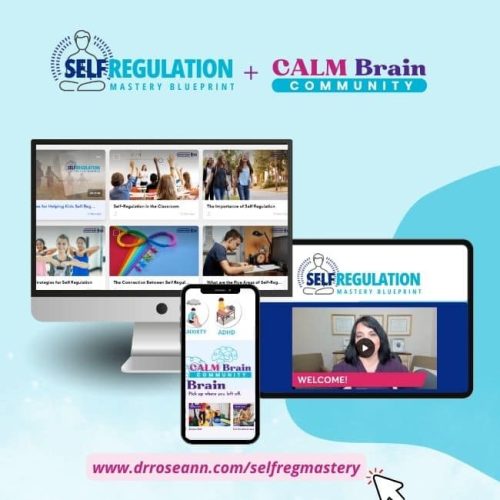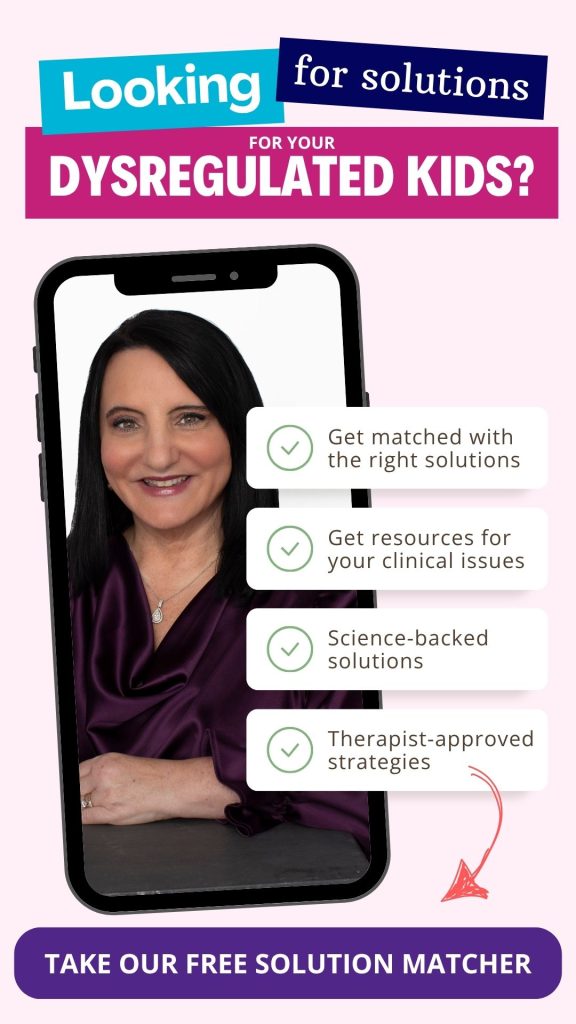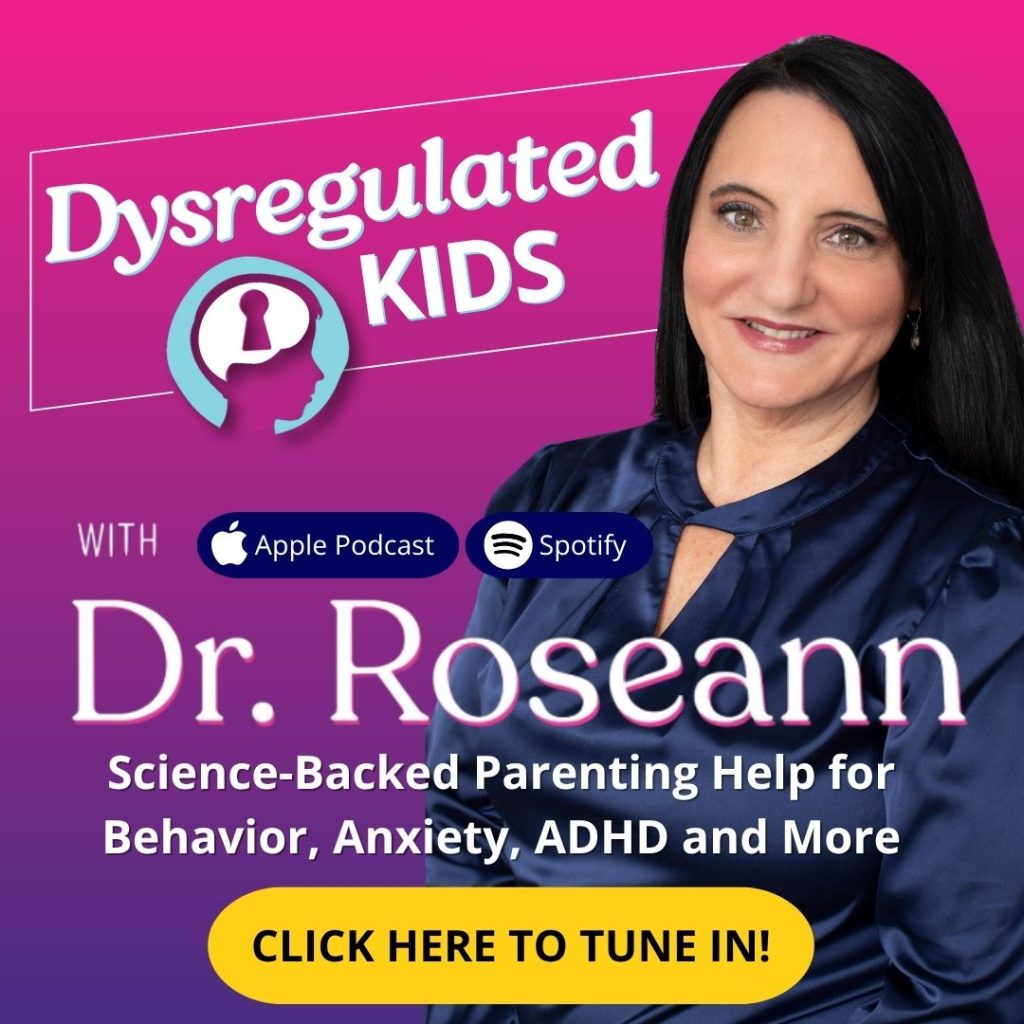As parents, watching your child struggle with attention, anxiety, peer or learning issues, can be heart-wrenching. Finding a treatment that actually helps your child or treatment might be as elusive as finding an albino tiger!
Seriously, the parents I work with in our BrainBehaviorReset® Program feel like they have gotten through a neverending obstacle course by the time they get to me! Getting help for your kiddo shouldn’t be that hard.
One time-tested and highly researched treatment that most parents haven’t heard of is neurofeedback. Neurotherapy is a cutting-edge approach that can make a significant difference in your child’s behavioral and mental health journey. But what is Neurotherapy treatment, and how can it help?
What is Neurotherapy?
Neurotherapy, also known as neurofeedback therapy or brainwave therapy, is a non-invasive treatment that uses real-time monitoring of brain activity to help individuals self-regulate their brain function. Essentially, it trains the brain to operate more efficiently and can significantly improve symptoms of anxiety, OCD, and mood disorders.
One critical aspect that makes neurotherapy different from other treatments is the involvement of a trained neurotherapist. Unlike general medical professionals, neurotherapists have specialized training to support the brain and behavior. This dual focus is crucial for achieving long-term behavioral changes. So, when you search for a neuro therapist, ensure that you find one who can provide comprehensive care tailored to your child’s unique needs.
At our center, we believe in the power of supporting both the brain and behavior simultaneously. This approach, known as the BrainBehaviorReset® Program, aims to create lasting behavioral changes by addressing the underlying neural pathways. By working with a neuropsychotherapist, your child can develop healthier thought patterns and behaviors, improving mental health outcomes.
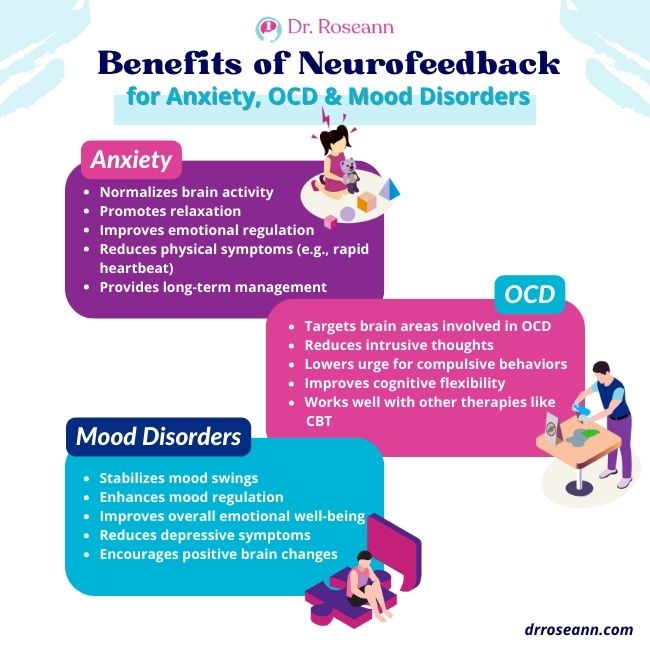
How Neurofeedback Can Help Anxiety, OCD, and Mood
Unlike traditional therapies that often focus solely on managing symptoms, neurofeedback therapy works by retraining the brain itself, promoting healthier neural pathways and more stable emotional states. Let’s explore how neurotherapy can specifically benefit those struggling with anxiety, OCD, and mood disorders, supported by research and clinical evidence.
Anxiety
Neurotherapy for anxiety works by helping the brain regulate its activity, reducing the hyperarousal state often associated with anxiety. Research shows that neurofeedback therapy can decrease anxiety symptoms by promoting relaxation and improving emotional regulation.
In one study, neurofeedback and heart rate variability training are tested as non-drug treatments for anxiety and depression. This study was done on 183 children and adults using both treatments together.
Results showed significant reductions in anxiety and depression symptoms, with 82.8% of people improving in anxiety and 81.1% in depression. Brain activity, breathing patterns, and heart rate variability improved, and blood pressure decreased in those with hypertension. This suggests that neurofeedback and heart rate variability training can effectively reduce anxiety and depression without medication while also enhancing overall health (White et al., 2017).
OCD
Obsessive-Compulsive Disorder (OCD) is characterized by intrusive thoughts and repetitive behaviors. Neurotherapy treatments target the specific brain regions involved in OCD, helping to reduce these intrusive thoughts and compulsions.
One study looked at how well neurofeedback works for treating OCD. Thirty-six people with OCD who didn’t get better with medicine tried neurofeedback guided by brain activity (QEEG). They had 9 to 84 sessions, each lasting 60 minutes.
Out of 36 people, 33 showed improvement in their OCD symptoms. Tests showed that not only did their OCD get better, but overall mental health scores improved, too. After about two years, 19 people still felt the benefits (Sürmeli & Ertem, 2011).
Mood Disorders
Mood disorders, including depression and bipolar disorder, can be debilitating. Neurotherapy helps by stabilizing brain activity and enhancing mood regulation. Research shows that neurofeedback therapy can improve mood and overall emotional well-being.
A study explored how neurofeedback using real-time fMRI can help regulate emotions by down-regulating amygdala activity. Fifteen healthy subjects underwent four real-time fMRI sessions where they received feedback on their amygdala activity while applying a “reality check” strategy during emotional stimulation. Results showed significant decreases in amygdala activity compared to a control group and improved connectivity with brain regions involved in emotion regulation (Herwig et al., 2019).
The Benefits of Neurotherapy Treatments
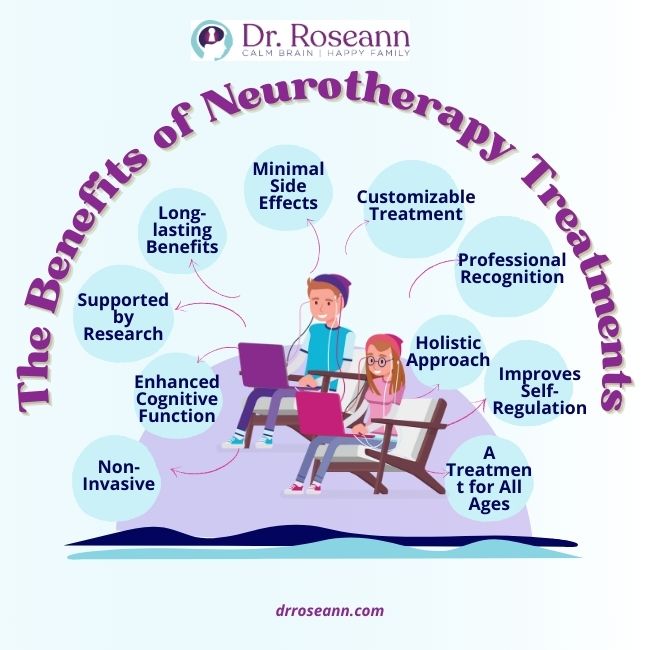
Individuals or parents considering neurotherapy for anxiety, OCD, or mood disorders can take comfort in the knowledge that this treatment is effective and non-invasive. Here are some key benefits:
- Minimal Side Effects: Neurotherapy side effects are minimal, especially compared to medication.
- Long-lasting Benefits: The positive effects of neurotherapy treatment can be enduring.
- Supported by Research: Neurotherapy is backed by extensive research, demonstrating its efficacy.
- Professional Recognition: Mental health professionals increasingly recognize it as a valuable tool.
- Non-Invasive: Unlike some treatments, neurotherapy doesn’t involve surgery or medications.
- Customizable Treatment: Tailored to individual needs, addressing specific brain activity patterns.
- Holistic Approach: Integrates brain and behavior support for comprehensive care.
- Improves Self-Regulation: Helps individuals learn to control their brain activity, enhancing emotional regulation.
- Enhanced Cognitive Function: Improve focus, attention, and overall cognitive performance.
- A Treatment for All Ages: Effective for children, adolescents, and adults with various mental health conditions.
Understanding neurotherapy treatment and how it can help your child is the first step towards making informed decisions about their mental health care. Combining brain and behavior support through neurotherapy provides your child with a powerful tool to overcome anxiety, OCD, and mood disorders.
If you want to get to the bottom of your child’s issues, take our free Brain and Behavior Solutions Matcher now so we can recommend the right product and services for your family.
Frequently Asked Questions
What is neurotherapy treatment?
Neurotherapy is a treatment approach utilizing technology to regulate brain activity to enhance cognitive function and emotional well-being.
What does neurotherapy treatment involve?
Neurotherapy treatment employs techniques like neurofeedback to train the brain and manage conditions such as anxiety or ADHD.
Who is a neurotherapist?
A neurotherapist is a trained professional who administers neurotherapy treatments and guides patients through regulating brain activity.
What are the potential side effects of neurotherapy?
While generally safe, individuals may experience temporary side effects like mild headaches or fatigue.
What is neurofeedback therapy used for?
Neurofeedback therapy addresses various conditions, including anxiety, ADHD, PTSD, and insomnia, by training the brain to self-regulate.
Is neurotherapy FDA approved?
Neurotherapy techniques, such as neurofeedback, are generally recognized as safe by the FDA for therapeutic use.
What is the purpose of brain scan neurofeedback?
Brain scan neurofeedback provides real-time information about brain activity to help individuals learn to regulate brain function more effectively.
What is neuroadaptation?
Neuroadaptation refers to the brain’s ability to adjust and reorganize its neural pathways in response to new experiences or stimuli.
What is neurotherapy for anxiety?
Neurotherapy for anxiety involves using techniques like neurofeedback to help individuals manage anxiety symptoms by training their brains to regulate emotional responses.
Dr. Roseann is a mental health expert in Neurofeedback who frequently is in the media:
- Living with Lyme (Podcast) Neurofeedback and biofeedback for PANS/PANDA
- BCIA: Calming the OCD Brain with Neurofeedback and ERP Therapy
- Helping Children Thrive Podcast Benefits of Neurofeedback for children with ADHD
Citations
Sürmeli, T., & Ertem, A. (2011). Obsessive compulsive disorder and the efficacy of qEEG-guided neurofeedback treatment: a case series. Clinical EEG and neuroscience, 42(3), 195–201. https://doi.org/10.1177/155005941104200310
Herwig, U., Lutz, J., Scherpiet, S., Scheerer, H., Kohlberg, J., Opialla, S., Preuss, A., Steiger, V. R., Sulzer, J., Weidt, S., Stämpfli, P., Rufer, M., Seifritz, E., Jäncke, L., & Brühl, A. B. (2019). Training emotion regulation through real-time fMRI neurofeedback of amygdala activity. NeuroImage, 184, 687–696. https://doi.org/10.1016/j.neuroimage.2018.09.068
Always remember… “Calm Brain, Happy Family™”
Disclaimer: This article is not intended to give health advice and it is recommended to consult with a physician before beginning any new wellness regime. *The effectiveness of diagnosis and treatment vary by patient and condition. Dr. Roseann Capanna-Hodge, LLC does not guarantee certain results.
Are you looking for SOLUTIONS for your struggling child or teen?
Dr. Roseann and her team are all about science-backed solutions, so you are in the right place!



